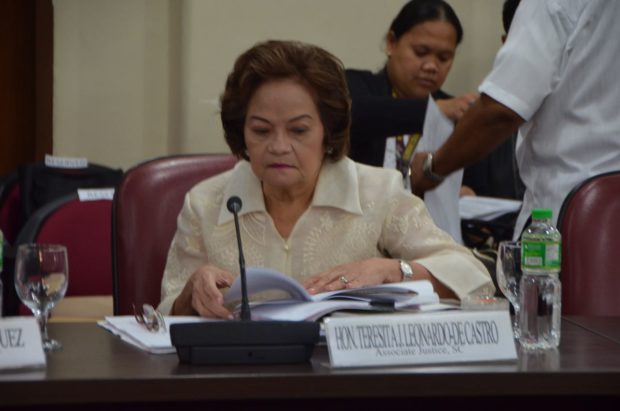Sereno undermined SC, De Castro tells House

Associate Justice Teresita de Castro during the House hearing on the impeachment of Chief Justice Maria Lourdes Sereno. INQUIRER.net / Noy Morcoso
Chief Justice Maria Lourdes Sereno “undermined” the Supreme Court by issuing an order in November 2012 reviving a judicial office in Central Visayas that did not reflect the consensus of the full court, Associate Justice Teresita Leonardo-de Castro said during her first appearance at the impeachment hearing in the House of Representatives on Wednesday.
“I cannot stand idly by when the power of the Supreme Court is being undermined and when the decision we reached collectively are being set aside or changed,” De Castro said.
But De Castro, who was granted leave by the Supreme Court on Tuesday to testify before the House justice committee, declined to say whether Sereno’s actions constituted a violation of the 1987 Constitution.
“I decline to answer that question,” she said in reply to Majority Leader Rodolfo Fariñas, who asked if she thought Sereno’s issuance of Administrative Order 175-2012 dated Nov. 9, 2012, and Administrative Order 185-2012 dated Nov. 27, 2012, violated the Constitution.
Already answered
Fariñas, however, said De Castro already answered the question in her own memorandum, dated Dec. 3, 2012, challenging Sereno’s orders.
He quoted the seventh paragraph of De Castro’s memo as stating that the two orders “transgressed the said constitutional authority of the court en banc and the statutory authority of the OCA (Office of the Court Administrator).”
De Castro insisted she was not motivated by a personal grudge against Sereno, a newcomer to the Supreme Court promoted to Chief Justice by President Benigno Aquino III over the heads of more senior justices in August 2012.
De Castro’s testimony—the first by a sitting Supreme Court justice in a House inquiry—was sought by the impeachment panel to give weight to lawyer Lorenzo Gadon’s charge that the Chief Justice defied the full court in ordering the formation of a Judiciary Decentralized Office (JDO) in Region 7 (Central Visayas).
She said the JDO had functions similar to the existing Regional Court Administrative Office (RCAO), though removed from the jurisdiction of the OCA.
Sereno’s order also named former Cebu City judge and now Sandiganbayan Associate Justice Geraldine Econg as head of the office, contrary to full-court decisions in 2006 designating the court administrator as implementer of the RCAO pilot project, De Castro said.
Neither the Chief Justice nor the Supreme Court has the authority to create a permanent office, but that appeared to be Sereno’s intent in creating the JDO, she said.
Full-court deliberations
De Castro said she questioned Sereno’s first order in a Nov. 26, 2012, letter to her fellow justices, prompting full-court deliberations in which the justices expressed their opposition to the creation of the office and agreed among themselves to form a study group instead.
So as not to embarrass the Chief Justice, De Castro said, the justices conceded that Econg was to head the group.
In that meeting, Sereno pledged to the others that, “I will amend my administrative order,” according to De Castro.
But the Chief Justice’s subsequent Nov. 27, 2012, order did not reflect the consensus reached by the magistrates in that discussion, stating instead that the full court had “ratified” her previous issuance, although it shortened Econg’s term to two months.
De Castro said she questioned Sereno’s new order in a Dec. 3, 2012, memorandum, prompting another full-court deliberation.
On Jan. 22, 2013, the Supreme Court issued a corrective resolution superseding Sereno’s earlier orders and creating a “Decentralization Needs Assessment Committee.”
De Castro said this new issuance was made so Sereno could save face—again.
Asked by Fariñas if the Supreme Court’s resolution was a form of “rebuke,” she said it was a “subtle way of overturning” Sereno’s previous issuances “because the court did not want to embarrass the chief.”
“And on my part, I’m not after putting her down. I just wanted to correct what she had done,” De Castro said. “To put this in the proper context, as decided by the court.”
De Castro said Sereno never responded to her memorandums questioning the creation of the JDO: “She didn’t say anything. She didn’t answer my letters. She didn’t do anything.”
Sereno’s spokesperson Jojo Lacanilao, however, issued a statement rejecting De Castro’s assertions (See story on this page).
De Castro also confirmed that she objected to Sereno’s alleged alteration in May 2013 of a draft temporary restraining order that she had written.
She scored Sereno for stating that her “blanket TRO” was issued upon her recommendation.
“[W]hat I did not like is I was alluded to as the one who recommended,” she said.
“Why did she put there that the TRO was upon my written recommendation? That is not true,” she said. “I cannot defend or support what she did because it was not really my recommendation.”
‘Member in charge’
De Castro said Sereno should have followed her recommendation to limit the TRO’s scope to the Coalition of Associations of Senior Citizens of the Philippines Inc., as she was the “member in charge” of the intraparty dispute.
But Sereno ended up stopping the Commission on Elections from proclaiming other party-list groups as well. Yet, it stated it was issued “upon the recommendation of member in charge.”
Rep. Henry Oaminal asked if the Chief Justice was really bound by the “recommendation” of the member in charge. He asked if that was “more or less final where the Chief Justice has no other thing to do except approve.”
De Castro replied in the affirmative. If Sereno had a different view, De Castro said, “she should have at least consulted the member in charge because the member in charge is the one who thoroughly studies the case.”
“If she wanted to change or if she changed my resolution, she should have issued it on her own authority without reference to the member in charge,” she said.














